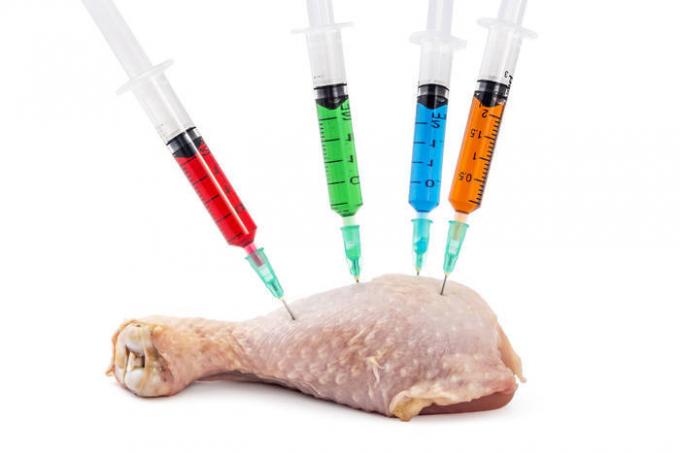Is it really useful to fresh juices and why frozen vegetables are sometimes better than fresh? Expose popular myths about the product!
Want as soon as possible grow thin? In pursuit of perfect skin and a figure you can considerably impair health. Stop! After reading these tips, you are sure to revise your diet.
Myth 1. As little as possible fat in the diet
- Let's start with the fact that fats - are compounds of glycerol and fatty acids. A fatty acid may be saturated or unsaturated. Unsaturated fats - useful. They are found in foods such as fish, nuts and vegetable oil. The most valuable of them - omega-3 and omega-6.
- Saturated, harmful fats are rich in meat products, pastries, various mayonnaise sauces, fast food. In the need to comply with the norm. Excess fat in the diet is fraught with obesity, atherosclerosis and heart disease. But stick to the fat free diet is also very bad! This threatens deficiency of vitamins A, E and D and hormonal disorders.
Important! The daily diet of fats should make up 20-30%. Of this amount, the share of saturated fat should account for 1/3, on the proportion of unsaturated - 2/3.

4 myths about nutrition: revise your diet immediately / istockphoto.com
Myth 2. All sugar substitutes - is harmful chemicals
Sweeteners are different. Some really unprofitable - it aspartame and sodium cyclamate. But there are also completely harmless sugar substitutes. For example, sucralose - it does not contain calories. And this is 600 times sweeter than sugar, from which is produced. This is ideal for people with metabolic disorders.
For those who want to reduce the amount of calories taken specifically suitable sweetener, which is not conducive to sharp fluctuations in glucose levels. Perfect option - stevia, It is obtained from a plant extract. It is sweeter than sugar but calorie-free and does not cause sudden glucose spikes. Stevia strengthens immunity, improves liver and pancreas.
Myth 3. Every day should drink fresh juices
It is believed that the juice is not only rich in vitamins, but also to treat the disease. Therefore, many of them drink liters, sometimes even on an empty stomach. Juice therapy but have contraindications and can lead to health problems. For example, apple and orange juice can not be used for gastritis with high acidity, ulcers stomach and pancreatitis as well as organic acids contained therein stimulates the secretion of gastric juice. A carrot juice is not necessary to drink for liver diseases, because vitamin A is stored in the liver and aggravates her defeat. In addition, fruit and berry juices contraindicated in diabetes - they have a high glycemic index and contain large amounts of simple sugars. For the same reason you should not drink these juices for people with excess weight.
Important! Disease prevention juices are useful (but not on an empty stomach and in moderation!), But they can not cure the disease in the same way as drugs. In addition, eat a fruit or vegetable itself is much more useful than drink the juice from them. Why?
1. On contact with oxygen during juicing vitamins begin to oxidize.
2. Vegetables and fruits contain fiber, which protects against cholesterol, and improves bowel motility, and create a feeling of fullness helps.

4 myths about nutrition: revise your diet immediately / istockphoto.com
Myth 4. Better than fresh vegetables than frozen
Many believe that in the frozen vegetables content of nutrients close as possible to zero. In fact it is not. Of course, fresh vegetables from the garden contains the most vitamins and minerals. Therefore, in the summer and autumn stands to gain vitamins of fresh vegetables. But in the winter or spring, when the vegetables for a long time "languishing" in warehouses and shelves, they are not nearly as useful as frozen.
The fact is that under the influence of oxygen and light vegetables lose their useful properties. For example, the amount of vitamin C contained in broccoli, for 6 days storage at room temperature is reduced by approximately 60%. Even worse, if the vegetables are stored at ambient temperature, in the light. Over the two days of this storage, for example, in parsley or spinach loss of ascorbic acid will be up to 80%!
Important! Now a lot of off-season vegetables for sale are subjected to the procedure of shock freezing. The cut products fall into the freezing tunnel where there is a rapid, each shock freezing vegetable slices to -40 ° C. Shock freezing preserves the original in vegetables supply of nutrients. Vitamins stored up to 90% (the content of vitamin C only slightly reduced). A trace stored at 100%, because the production of vegetables are processed within a few hours after being collected.
Also you will be interested to read this:5 female vitamins for beauty and health: what to look for their products




